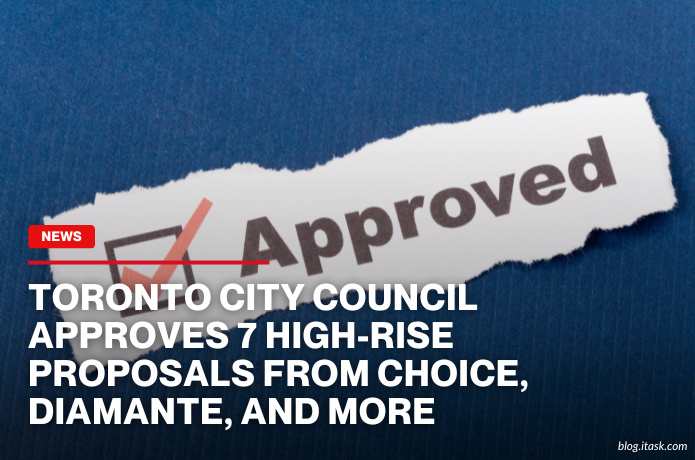Toronto City Council Approves 7 High-Rise Proposals From Choice, Diamante, And More
Toronto City Council Approves 7 High-Rise Proposals From Choice, Diamante, And More

Toronto City Council met in late May and approved seven new high-rise development proposals across the city, in a clear sign of the city’s intensified focus on accelerating housing construction to meet provincial targets. This wave of approvals included projects led by Choice Properties REIT, Castlepoint Numa, Diamante Development, and others, all of which were accepted with only minor adjustments to their plans.
Among the approved developments is a plan for 123 Parkway Forest Drive submitted by Choice Properties REIT on behalf of Emerald GP Inc. The developer had initially proposed a 29-storey building back in August 2021. After revisions, the most recent version calls for a 33-storey apartment tower with 384 rental units, including six dedicated affordable units. Nearly half of the units will be secured as rental housing for 20 years to compensate for the existing rental units on the site. The mix includes studios through three-bedroom layouts.
Castlepoint Numa received council approval for two separate projects. The first is at 72 Perth Avenue, where plans have evolved over several years—from a 10-storey, 108-unit scheme in 2022 to an 18-storey, 262-unit project with affordable units included. The current layout offers 26 studios, 118 one-bedroom, 92 two-bedroom, and 26 three-bedroom units, including 13 affordable rental units. The second Castlepoint Numa project is at 1798–1812 Weston Road, now approved as a 40-storey building with 490 units, including six replacement rental units. That project includes studios through three-bedroom apartments and ground-floor commercial space.
Overall, these approvals came as the city works toward a provincial goal of delivering 1.5 million new homes by 2030. As part of that, Toronto aims to build 285,000 homes over ten years—but has delivered just over 71,000 units since 2022 and fell short of last year’s target of 23,750 with only about 18,422 starts recorded in 2024.
City staff note that Toronto’s development review process is undergoing streamlining through a new Development Review division, with the goal of approving more applications more quickly. The high rate of approvals in May suggests progress toward trimming delays that used to stretch nearly two years for major projects.
These projects, spanning mid-rise to tall towers and multiple wards across Toronto, reflect both public and private sector efforts to meet rising housing demand. Many now include affordable rental units and replacement rentals to offset displacement. With more approvals like these, the city hopes to steadily ramp up construction activity in the coming years.
